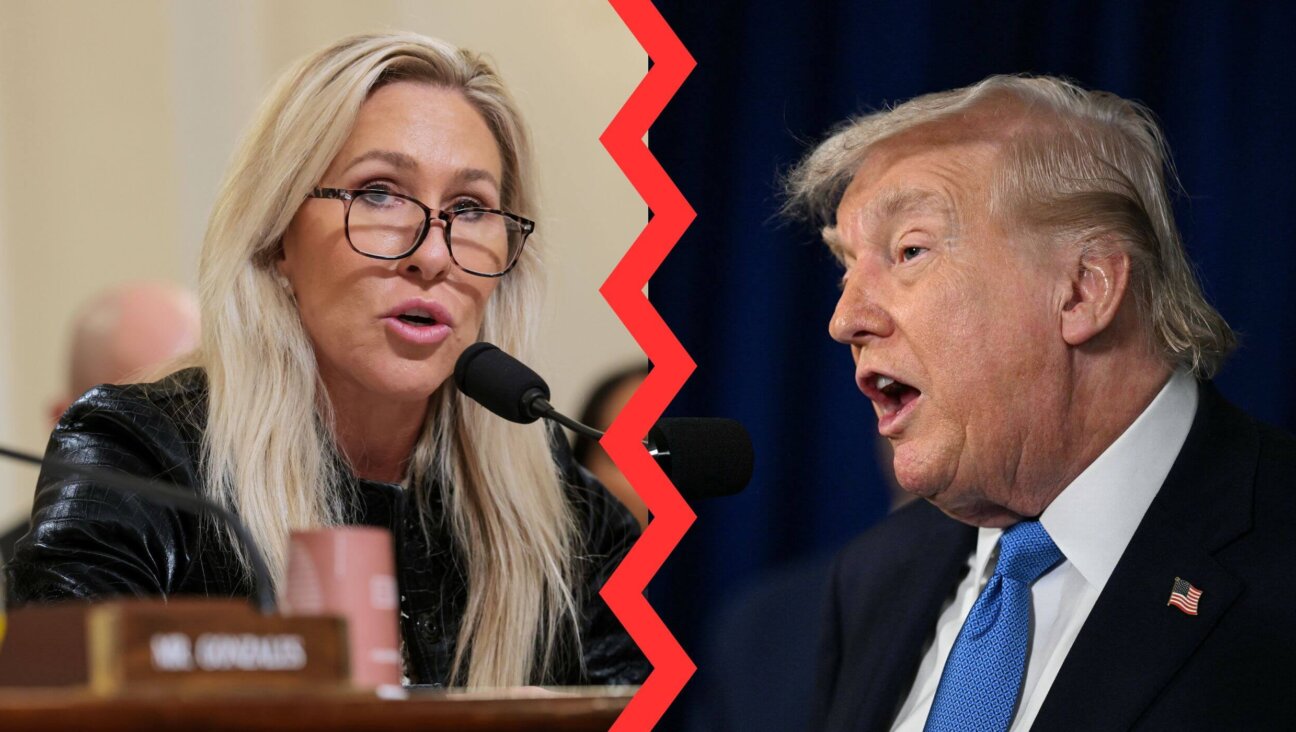Poverty Is a ‘Jewish’ Issue
One year ago, I had the opportunity to meet with President Bush, along with 15 other rabbis, just a few days before Yom Kippur.
Each of us was offered the opportunity to raise a question with the president. I chose to speak about the issue of poverty, in particular the concern for low-income parents who have no child care for their kids. The president and I engaged in a dynamic discussion. We may not have agreed on all of the issues but it was a genuine exchange of ideas.
A week or so after the meeting, following Yom Kippur, a letter to the editor was published on the editorial page of this newspaper. It was written by one of the rabbis who had been at the meeting. In his letter, the rabbi questioned whether it had been appropriate for me to address the issue of poverty with the president. The meeting, the rabbi wrote, should have been used to address “Jewish” issues, of which poverty was not one.
It worries me, profoundly, to think that a leader in the Jewish community does not view a social justice issue such as poverty as a “Jewish” issue. This type of thinking, I believe, is a complete misreading of our tradition.
I believe our tradition expects us to know and understand that all issues are Jewish issues. Judaism has an opinion about not only poverty, but also child care, welfare, Social Security, unemployment, national security, the environment, war prejudice, minimum wage and even stem-cell research. We know this from the hundreds of commandments and texts that speak directly to these issues.
Last week, for example, we observed Yom Kippur, the holiest day of the Jewish year. Its importance is clear, and yet there are only four sentences in the Torah that tell us to observe this day. Much the same can be said for Rosh Hashana, with three sentences, and saying the Shema, with only one.
The numbers stand in stark contrast to the commandments about business ethics, almost 40, and instructions about courts and legal actions, about 20. Laws on caring for the poor and those on the fringes of society, I would remind the rabbi, number no fewer than 100.
If this weren’t proof enough, we can go to the Prophets, who preach almost exclusively about fairness and right. Jeremiah calls us to “seek peace in the city where your god has exiled you, and pray for it, for in its peace, will you have peace.” Amos, Isaiah and Micah all call upon us to get involved in our world to bring righteousness to every corner of society. Following the same path, the rabbis of the time of the Talmud wrote entire tractates on such subjects as damages, finances, welfare systems, health and government.
Our texts clearly show us that all issues are Jewish issues.
Being Jewish, continually vigilant to the world around us, is not easy. It is full-time job. Being a responsible Jew means carrying our tradition and its beliefs around with us to all our discussions and debates. More than that, we must make room for them to be a participatory and audible voice in the dialogue.
Inviting our Judaism into the discussion, I realize, is not always easy to do. To begin with, we must know what Judaism actually says on any given issue. That is indeed a challenge, for few of us have access to the breadth of writings on these topics. It is hard to find the material on stem-cell research, for example. To do so, you would have to know your way around the Mishna and Talmud and find sections that speak about what, if any, parts of a deceased person can be used to save another life. Our ancestors were debating stem-cell research more than 2,000 years ago. What could be a more profoundly Jewish issue?
There are many good resources out there to give us the information we are looking for. Of course, there are books and classes, and just reading the Torah will help, but probably the easiest resource is the Internet. Take a few moments and search online for “poverty and Judaism,” or try “taxes and Judaism” or “welfare and Judaism.” You will find a whole host of Web sites that will fill you in on the Jewish perspective. On some issues you will find uniformity of texts and interpretations. On others issues, you will find diversity and debate. This is the beauty of our tradition. But the important thing for us to do as responsible Jews, particularly in this critically important political time, is to search and read and open ourselves to the influence of our Jewish tradition on our decisions.
Of course, one of the greatest challenges comes when our study and debate steer us toward the least popular viewpoint on an issue. In such a case, our tradition not only expects us to stay committed to our decision, but also to engage with others about it.
Jewish tradition, I believe, vindicates my decision to raise the issue of poverty with the president. I turn to words of Rabbi Moshe ibn Chabib from the 18th-century work “Esh Dath,” which offers a telling discussion of the laws governing capital punishment.
For such cases, a full panel of 23 judges must hear the case. If the judges vote unanimously against the accused, Judaism commands that he be set free.
Why has our tradition created such an illogical rule? Because Judaism believes that there must always be someone who brings an alternative view to the table. The unanimous decision is unacceptable because there will be no debate. The one person who thinks the defendant is innocent must speak out to try to change the opinions of his or her peers. Engaging in a dialogue is the “Jewish thing to do, even when we are in the minority.
We come from a tradition that not only respects debate, it demands it.















